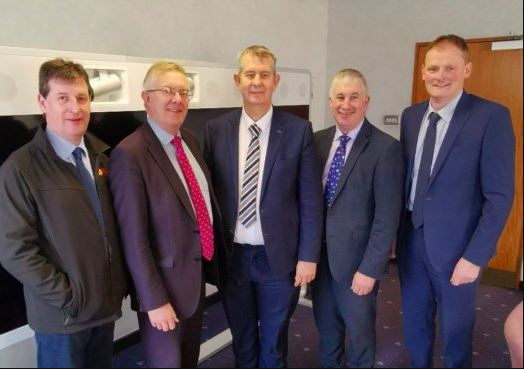Members of the Ulster Farmers’ Union (UFU) have held an “encouraging” first meeting with the newly appointed agriculture minister in Northern Ireland, Edwin Poots.
The meeting took place yesterday, Wednesday, February 5,. The purpose was to discuss “several major immediate and strategic issues for the farming sector”.
Speaking after yesterday’s meeting, UFU president Ivor Ferguson commented: “The UFU engaged in a very constructive and encouraging meeting this morning with Agriculture Minister Edwin Poots. We raised a number of issues that need to be addressed with urgency after three years of a political vacuum locally.
Decisions regarding key animal health issues such as the control of bovine TB; planning and ammonia; and of course Brexit and future support payments for farmers.
“We also raised several more immediate issues on which decisions could be taken now that our executive has been restored and ministers have been appointed,” Ferguson added.
These issues, Ferguson explained, include progress on both the Environmental Farming Scheme and Farm Business Improvement Scheme; and other initiatives relating to food marketing, livestock genetic improvement, soil testing and BVD eradication.
“Another matter which was high on our agenda and was brought to Mr Poots attention, was the farmers who were affected by the 2017 flooding in the Glenelly Valley, Co. Tyrone and have still not been compensated for their loses,” Ferguson highlighted.
“Mr Poots took all our concerns on board. We look forward to engaging with him in the future to find solutions to these issues that will protect and enhance the future viability of our family farms and agri businesses,” Ferguson concluded.
£293 million in direct payments
Earlier this week, Poots confirmed that farmers in the north will share £293 million in direct payments for the 2020 scheme year, and that “full payments” will be made from October 16 this year.
Poots said: “Following the passage of the necessary legislation by parliament, I am pleased to confirm that the arrangements for £293 million in direct payments for the 2020 scheme year are now in place.
“The 2020 scheme will operate in a similar fashion to that in 2019, apart from a small number of issues where change is necessary as a result of our exit from the EU,” he explained.

